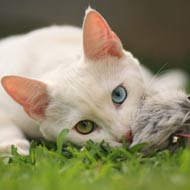Cat charity warns of skin cancer risk

Cats Protection is urging owners of white cats to keep them indoors during the hottest parts of the day.
Leading UK charity Cats Protection has shared the stories of two cats that suffered serious sun damage, in hopes of encouraging owners to protect their pets.
According to the charity's clinical veterinary officer Beth Skillings: "We regularly see cats in our care with badly sunburned ears which need to be amputated to prevent the development or spread of cancer."
Older cat Jenny, for example, had to have both ears amputated when she was handed in to the charity's branch in Caterham. Pre-cancerous cells had developed in her ears.
Since undergoing surgery in June, she has been adopted by Tracy Musgrove from South Nutfield, Redhill.
Similarly, a white-and-tabby stray called Martin was handed into the Derby centre. Martin had developed feline skin cancer in the tips of his ears as a product of years of sun exposure.
After an operation to remove his ear tips he is now ready to be rehomed with an owner who will vigilantly protect him from the sun.
As temperatures remain high, Cats Protection is urging those with white cats to keep their pets indoors during the hottest parts of the day.
"White cats, or those with unpigmented white noses or ears, are at the greatest risk," Beth added. "It may take a few years before the damage is visible but, once the early stages of cancer set in, it is important cats are given urgent veterinary treatment to prevent it spreading."



 The latest
The latest